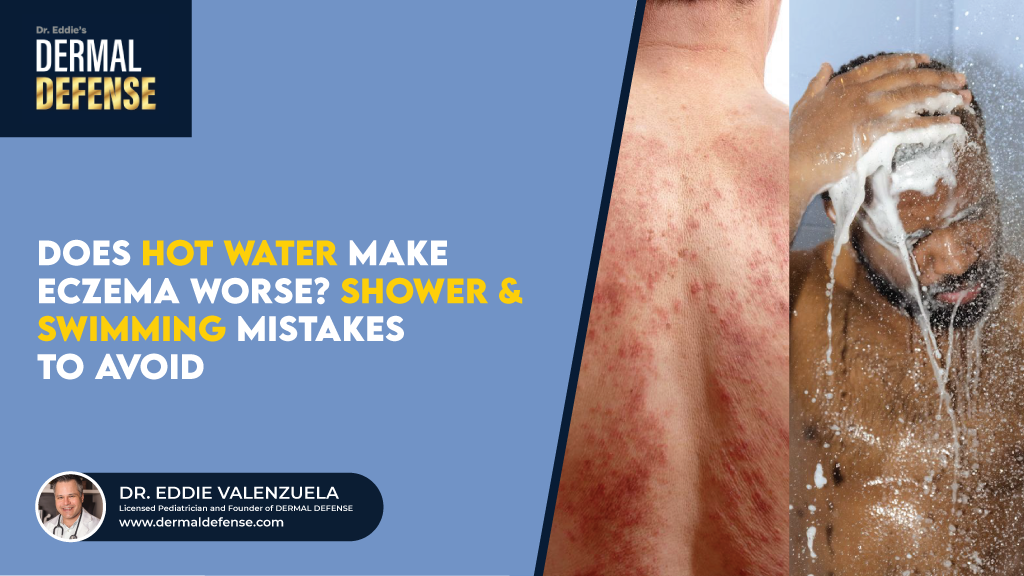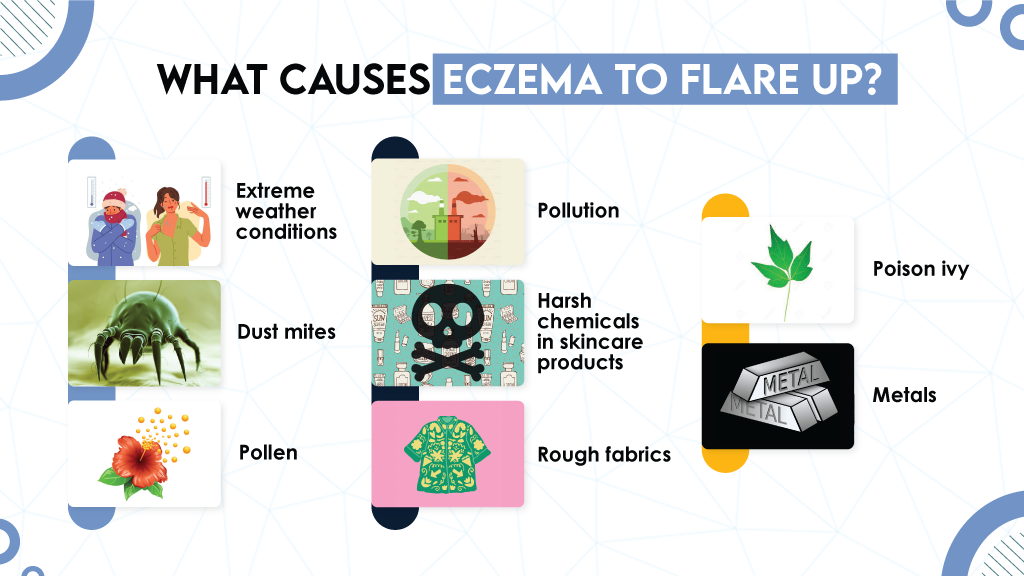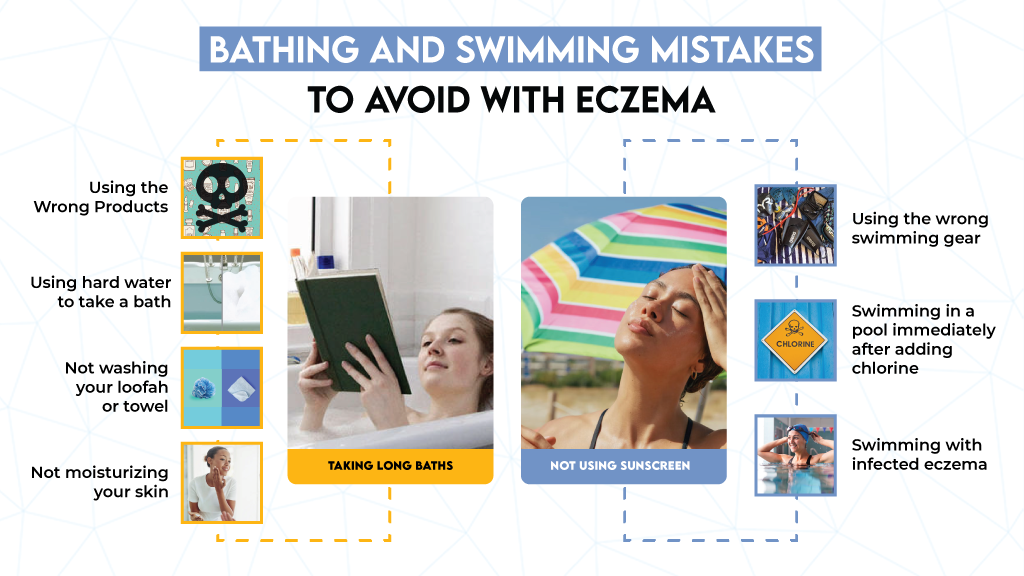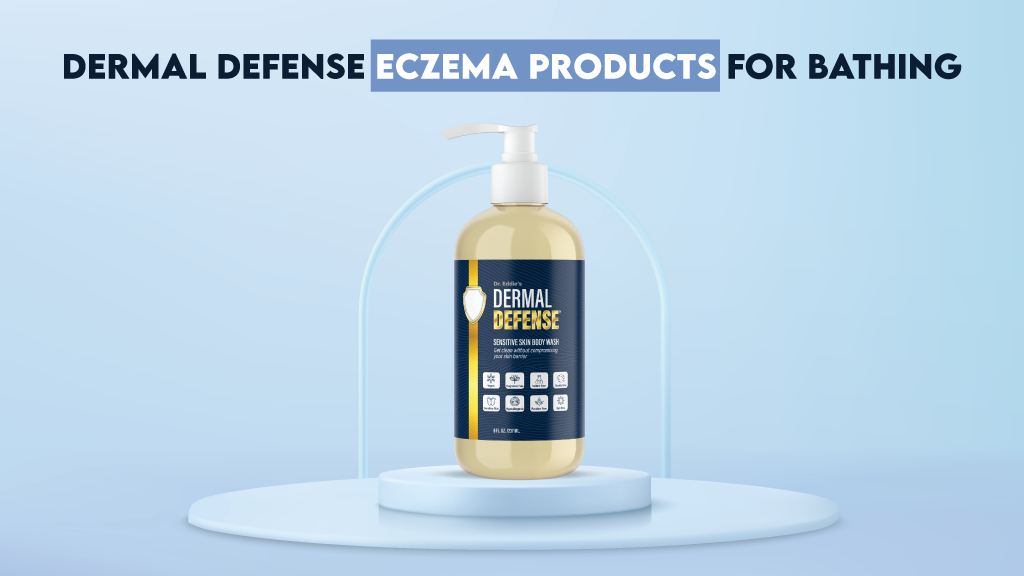Does Hot Water Make Eczema Worse? Shower & Swimming Mistakes to Avoid

Taking a shower daily and washing your skin is part of good hygiene, and it is even more important if you are dealing with eczema, as it helps remove irritants from the skin that can worsen your condition.
Have you ever noticed that your eczema-prone skin becomes extra itchy after taking a hot shower or swimming in the pool? Well, it’s because we often make some tiny mistakes while bathing that can trigger an eczema flare-up.
This blog will answer one of the most frequently asked questions: Does hot water make eczema worse? It will also provide you with insight into all the little mistakes you might be making during swimming or bathing that could be exacerbating your eczema.
Does Hot Water Make Eczema Worse?
The short answer to this question is yes!
And the long answer to it is that yes, hot water can make your eczema worse or trigger a flare-up. How? Hot water can strip away natural oils from the skin and leave it dry, rough, and irritated. Additionally, hot water can increase the inflammation in the skin. This is why if you are already experiencing eczema, then hot water or showers can further exacerbate your condition.
Why Does Hot Water Feel Good on Eczema?
Eczema and hot water have a weird relationship. Some people say that hot water feels good to their eczema-prone skin. Well, that’s because, just like long hot baths help the body and muscles relax in some people, it helps soothe their itching and irritation on the skin.
However, this is just temporary; once you get out of hot water, your skin starts becoming extra dry, and the itching and irritation get worse. So if you are thinking “are hot showers good for eczema?” the answer is a big no. Hot water may help provide temporary relief, but it can cause more harm than good in the long run.
According to the National Eczema Association always use lukewarm water instead of hot water to take baths.
What Causes Eczema to Flare Up?

Hot water is one of the triggers that can lead to an eczema flare-up. But you might be wondering, “Why does my eczema flare up even if I’m using lukewarm water?” It may be because there are many other triggers that can exacerbate your condition, some of the most common ones are:
- Extreme weather conditions
- Dust mites
- Pollen
- Pollution
- Harsh chemicals in skincare products
- Rough fabrics
- Poison ivy
- Metals
These are just some of the environmental triggers; however, apart from these, there are many mistakes that we often make while taking a bath or showering that can exacerbate eczema.
Bathing and Swimming Mistakes to Avoid with Eczema

Some of the common mistakes that we often make without realizing their aftermath for eczema-prone skin are:
Bathing Mistakes
- Using the Wrong Products:
Using bathing products such as shampoo, body wash, and soaps that contain harsh chemicals can further strip natural oils from your skin and make the itching and irritation worse.
- Using hard water to take a bath:
Using hard water to wash your eczema-prone skin can further exacerbate your eczema symptoms.
- Not washing your loofah or towel:
Not washing your bathing towel or the loofah you use to cleanse your skin regularly can become a breeding ground for bacteria. When you use these items, the bacteria can transfer to your skin and lead to infection.
- Taking long baths:
While baths may help cleanse your skin, taking very long baths can actually leave your skin dry and irritated.
- Not moisturizing your skin:
If you have eczema, you are more likely to experience skin dryness after showering, regardless of how careful you are. Not moisturizing your skin after a bath can worsen dryness.
Swimming Mistakes
- Not using sunscreen:
If you are going for a swim in an outdoor pool, lake, ocean, or pond, not protecting your skin with sunscreen can further exacerbate your condition.
- Using the wrong swimming gear:
Using swim gear such as swimsuits and caps that are made with latex or skin-irritating material can worsen the itching, irritation, and rashes associated with eczema.
- Swimming in a pool immediately after adding chlorine:
Chlorine can cause eczema flare-ups or skin irritation, so swimming in a pool with recently added chlorine can exacerbate your condition.
- Swimming with infected eczema:
Infected eczema is probably from a severe eczema exacerbation in which your skin may ooze, and going to a public pool full of bacteria can worsen your infection.
Does Chlorine Make Eczema Worse?
One common question we often get about eczema and pools is, “Can chlorine make eczema worse?” The answer is yes. Chlorine, is added to pools to disinfect the water.
However, for people dealing with eczema, it can be a harsh chemical that irritates the skin and makes their condition worse. And for some people, it can even trigger contact dermatitis and allergic reactions. This is why it is advised not to swim in a pool where chlorine has been added recently.
Tips for Swimming with Eczema
- Make sure the chlorine was added to the pool a few hours before you take a swim.
- Moisturize your skin with the help of a bland emollient or eczema moisturizing cream to help strengthen the skin’s barrier and protect the skin against irritants in the pool.
- Use swim gear made of silicone or any other eczema-friendly fabric to prevent irritation.
- Apply sunscreen with an SPF of 30 or higher to protect your skin from the sun.
- Keep your body hydrated on the inside by drinking plenty of water or fluids before going for a swim.
- If your swimsuit is new, make sure to wash it with a fragrance-free detergent before using it.
- Chlorine can stay behind on your skin even after you are out of the pool. This is why it is essential to immediately take a shower and cleanse your skin with the help of an eczema body wash.
- After cleansing your skin, be sure to moisturize it with a fragrance-free, hypoallergenic eczema cream, such as one by Dermal Defense, within 3 minutes after taking a bath while your skin is still slightly damp.
Eczema Tips for Bathing and Showering
Now that we have discussed the things to keep in mind while swimming, let’s discuss the things to take care of before and after bathing; after all, this is part of your daily routine.
Before Shower
- Close the bathroom door before taking a shower; this helps keep moisture in the room.
- Make sure the water you are using is not too hot; instead, use lukewarm or cool water.
During Shower
- Use a body wash for eczema that is free from any harsh or skin-irritating chemicals, such as fragrances, parabens, sulfates, dyes, and phthalates.
- Avoid using any chemical exfoliators or scrubs with beads to cleanse your skin.
- Instead of using sponges and loofahs, try using your hands to rub the body wash, as they can often irritate the skin.
- Limit your bath time to a maximum of 10 minutes.
After Shower
- Use a soft, clean towel to tap dry your skin instead of rubbing it.
- Use an eczema moisturizing cream that is fragrance-free, non-greasy, and fast-absorbing to moisturize your skin.
- Moisturize the skin immediately after the bath while the skin is a little damp, as it is able to absorb more moisture at that time.
- Let your skin penetrate the moisturizer properly before wearing clothes.
- Try dressing in eczema-friendly fabrics as much as possible.
Dermal Defense Eczema Products for Bathing

When you have eczema, you have to be extra careful with everything that you put on your skin, especially the skincare products. While there are many eczema bath products, such as body wash, shampoo, and soaps, available in the market, most of them still contain some harsh chemicals that can irritate the skin.
This is why Dr. Eddie at Deramal Defense has created an Eczema skincare bundle that is especially formulated for eczema-prone, sensitive skin of all ages. This bundle contains a Dermal Defense Sensitive Skin Body Wash that you can use to clean your skin while taking a bath or after a swim. And a Dermal Defense Eczema Moisturizing Cream to keep your skin hydrated and nourished all day long.
The best part about these products is that they are
- Fragrance-free
- Paraben-free
- Sulfate-free
- Dye-free
- BPA-free
- Cruelty-free
- Hypoallergenic
- Doctor-approved
The body wash contains ingredients like licorice root extract, apple fruit extract, aloe vera extract, oat extract, hyaluronic acid, and provitamin b5 that help soothe the itching,and irritation on the skin that can be found in those with eczema prone skin. And the eczema moisturizer contains glycerin, licorice root extract, and snow white petrolatum that help hydrate the skin and strengthen its natural barrier.
Key Takeaways
- Hot water may feel relaxing, but it can make your eczema symptoms worse.
- Always use lukewarm water to take a bath if you have eczema.
- Don’t swim in a pool in which chlorine has been added recently.
- Clean your body with an eczema cleanser immediately after taking a swim in the pool.
- After swimming or taking a bath, make sure to use an eczema moisturizer to lock in the moisture.
FAQs
- Does eczema flare up in hot water?
Yes, hot water can strip away natural oils from the skin and leave it dry and rough. The dryness can trigger an eczema flare-up or make your existing symptoms worse.
- How often should I bathe if I have eczema?
It is advised to take a bath every day if you have eczema, because bathing can help remove all the irritants and bacteria from the skin that may further exacerbate your condition.
However, make sure to use lukewarm water instead of hot water to take a bath and limit your bath time to 10 minutes maximum.
- Can eczema get worse after showering?
Yes, if you are making some bathing mistakes while showering, then your eczema can become exacerbated. Common mistakes include:
- Using hot water or hard water to take a bath.
- Taking long, hot showers.
- Using body wash and soap with strong, skin-irritating chemicals.
- Rubbing your skin with a towel to dry it.
- Not moisturizing your skin after taking a shower.
- What is the 3-minute rule for eczema?
The 3-minute rule means to moisturize your skin within 3 minutes after taking a shower while the skin is slightly damp.
- Can chlorine affect eczema?
Yes, for most people, chlorine can trigger an eczema flare-up or contact dermatitis or cause irritation on the skin that can make eczema worse.
- Eczema and the Immune System: Is It Autoimmune or Immune-Mediated? - February 18, 2026
- Eczema on Black Skin and Other Skin Tones: How It Looks, Symptoms, and Diagnosis - February 18, 2026
- The Link Between Eczema and Allergies: Triggers, Atopic March, and Managing Flare-Ups - February 18, 2026
